




 |
   |
 |
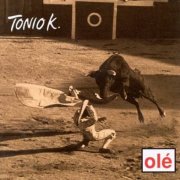 |
Olé (1997, recorded 1989, 53.17) ***/½ |
|
| Stop the Clock Time Steps Aside Maybe There Isn't Stuck That Could Have Been Me Hey Lady Come With Me I'll Remember You |
What a Way to Live Day and Night Pardon Me for Living We Walk on |
|
Current availability:
Chamberlin used:
Steven "Tonio K" Krikorian is probably better known as a songwriter than as a performer, having been covered by the likes of Al Green, Bonnie Raitt and Chicago, amongst many others. There's a story behind 1997's Olé: it was recorded around 1989 and should've been his fifth solo album, but A&M shelved it, no doubt for the usual cretinous record company reasons, so it finally saw the light of day eight years on through the indie Gadfly label. It's a fairly timeless roots rock/Americana album, lyrics possibly stronger than music, probably at its best on That Could Have Been Me, Hey Lady and What A Way To Live.
Some sources credit producer T Bone Burnett with Chamberlin; given how odd it would be to give him a fake credit, I think we'll have to accept it as genuine, although the only possible use is some very background strings on closer We Walk On.
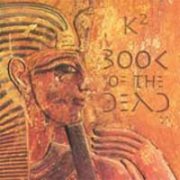 |
Book of the Dead (2005, 46.46) ***/TTChapter 1: Infinite VoyageChapter 2: Mirror to the Spirits Chapter 3: The Edge of Light Chapter 4: Aten (Window of Appearances) Chapter 5: Cloak of Antiquity |
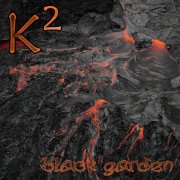 |
Black Garden (2010, 55.42) ***½/TTT½Black GardenPassage to the Deep Widows Watch Encounter or Absence Storm at Sunset Summer's Fall Path of the Warrior |
Current availability:
Mellotrons used:
The LA-based K2 (to spell their name correctly) are bassist Ken Jaquess' prog project, including not only Spock's Beard's Ryo Okumoto, but also legendary Brit fusion guitarist Allan Holdsworth (1946-2017), amusingly referred to as 'ex-UK' on prog reviews sites, although they were really only a blip in his lengthy career.
2005's Book of the Dead is, in some ways, a typical modern progressive release, although it has elements of fusion (mostly from Holdsworth), thankfully lacking the heaviosity of many current bands. However, it also lacks much compositional complexity, clearly written by someone whose chief listening is other progressive bands, so interesting key modulations are notable only by their absence and the material often plods. For those who love prog epics, opener Chapter 1: Infinite Voyage is twenty-three minutes of, well, prog, although to call it 'a Supper's Ready' of the new millennium', as their wildly over-enthusiastic biographer at ProgArchives has, is a little optimistic. Yes, the band utilise elements of Genesis and Yes, particularly in Jaquess' slightly unwelcome bass solos, but the song structures are more '80s neo-prog than classic-era, although Yvette Devereaux's violin makes a welcome change from the usual instrumentation. Jaquess plays Ryo's M400, with strings and/or choir present and correct on all but Chapter 4: Aten (Window Of Appearances), effectively a bass solo over drifting synths. I won't try to claim that the Mellotron use is the heaviest I've ever heard, but sometimes, subtle is best. Not a bad album, then, but, as with so many others, few real chances are taken (you know, what made the first couple of Spock's albums so exciting) and even though it's not overlong, it drags in places and finishes fairly abruptly, lacking any kind of musical closure.
Five years on, Black Garden is a distinct improvement on its predecessor, its fusion-inflected material showcasing a more original, very American sound, at least within the confines of the genre. Highlights include the epic Storm At Sunset, the solo-Mellotron-and-vocal Summer's Fall and closer Path Of The Warrior, although nothing here should upset fans of modern US prog. Much more Mellotron this time round, from both Jaquess and Okumoto, playing one or more of the M400s at Gene Stopp's studio, more notable use including the upfront strings on the opening title track, string swells throughout Widows Watch and the solo strings that underpin Summer's Fall, with string and/or choir parts on everything else.
See: Ryo Okumoto
 |
Kaguyahimesādo (1973, 37.48) ***/TT |
|
| Pokapoka Nichiyōbi Abīrōdo no Machi Keredo Ikite Iru Ate mo Naikedo Kiiroi Fune Son'na Hito Chigai Kandagawa Tōi Machi |
Totsuzen Sayonara Ōkina Kataomoi Bokunomunedeoyasumi |
|
 |
Live (1974, 44.17) ***/T |
|
| Uchi no Otōsan Bokunomunedeoyasumi Petenshi Kamo no Nagare ni Kimi ga Yokereba Karibu no Hana 22-Sai no Wakare Medorē - Imōto-Umi |
Hoshifuruyoru Okitegami Me o Tojite Ano Hito no Tegami Kandagawa |
|
Current availability:
Mellotrons used:
Kaguyahime were, for want of a better description, a folk/pop trio, sometimes known as Minami Kosetsu & Kaguyahime. Their third studio album, 1973's Kaguyahimesādo, is a perfectly acceptable effort, if a little unexciting, also home to their biggest hit, Kandagawa. It's probably at its best on Keredo Ikite Iru, the gentle Kandagawa and maybe closer Bokunomunedeoyasumi. Takahiko Ishikawa and Kosuke Kida play Mellotron, with chordal strings on Ate Mo Naikedo, upfront, high-in-the-mix flutes on Totsuzen Sayonara, near-subliminal choppy strings on Ōkina Kataomoi and cello and strings (and a flute line?) on Bokunomunedeoyasumi, as against the real strings on Keredo Ikite Iru.
The following year's self-explanatory Live includes material from their second, third and fourth albums, plus a non-album single, although several tracks don't seem to be on any other release, presumably making this a 'must-have' for fans. Best tracks? Bokunomunedeoyasumi (again), the upbeat Petenshi and Kimi Ga Yokereba, perhaps. Shigehite Ohara plays Mellotron, with chordal strings and a flute solo on Bokunomunedeoyasumi, partially replicating the studio parts. Did they really drag it along for one song, or was it used on ones that didn't make the final cut? We shall never know.
Kaipa (Sweden) see: |
 |
 |
March Forth (2008, 38.29) ***/TT |
|
| Oh No Seasons Song Traveling Feet Good Ones The Flood Inside Out Okay The Same |
Favorite Song Dog Stars Blue Sky Free Will Zone |
|
Current availability:
Chamberlin used:
The Brooklyn-based duo of Courtney Kaiser and Benjamin Cartel's debut, 2008's March Forth, is something of a naïf of an album, switching between dark, mournful, folk-inspired material like opener Oh No or Good Ones and cheerful, childlike songs along the lines of Season Song or Favorite Song in roughly equal measures. This would appear to be a tactic that could all too easily split their audience between bedsit-dwellers and small children. Maybe that's the point?
Both members play Chamberlin, with distant string notes on Traveling Feet, distant string chords on Good Ones and Blue Sky, nicely upfront flutes on Okay and quite overwhelming strings on Dog Stars, although the cello on a few tracks is real. A somewhat schizophrenic release, then, that might not appeal to anyone much in its entirety. I can't entirely vouch for three of its possible Chamby tracks, either, but two in-yer-face examples is more than we usually get.
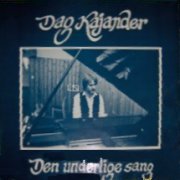 |
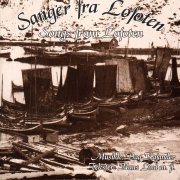 |
Den Underlige Sang [a.k.a. Sanger Fra Lofoten] (1982, 32.19/37.55) **/½ (T) |
||
| Nordlandssang Jul Krambua På Krita Den Underlige Sang Nordland-Sang Lofot Koral Egne Line |
Gubben Vågakall Nordlands-Sang Lofotbrev Di Sula Opp Litj Hans Grønt Lauv i Snyen Nordlands-Sang Længer Sør Længter Ikkje Vi |
[Reissue adds: Kreve Tien Tre Daga Tel Endes] |
||
Current availability:
Mellotron used:
Dag Kajander is a Norwegian composer and singer, several of his releases aimed at the children's market. 1982's Den Underlige Sang (reissued in 1995 as Sanger Fra Lofoten) veers between just-about-acceptable piano-accompanied or a capella folk and really-not-very-acceptable-at-all jaunty singalongs, which probably don't sound any better if you understand the language. Any better tracks? Egne Line stands out, with its female narrator, but it's pretty slim pickings.
Kajander and Inge Kolsvik both play Mellotron, with a rather weak flute line on Di Sula Opp and a slightly stronger one on closer Længer Sør Længter Ikkje Vi, the best use, however, being the flutes on Kreve Tien, one of two tracks added to the reissue. This can be heard on YouTube, which isn't to say it should be.
 |
The Reason Why Vol. 3 (2017, 52.11) ***/TIbakish TarekigneTrance Dance La Monde Avait 5 Ans I'm on My Way/Patch of Blue Ne Rien Voir, Dire, Entendre You Can Count on Me Sandy |
Current availability:
Mellotron used:
Goran Kajfeš is a Swedish trumpeter who, like many jazzers, plays with a bewildering variety of outfits, including Fire! Orchestra, Nacka Forum and his own ensemble, Goran Kajfeš Subtropic Arkestra. 2017's The Reason Why Vol. 3 is their third (and, to date, last) album, a jazz-rock stew of considerable intensity, particularly the freeform section in Patch Of Blue. Personal favourites? You Can Count On Me, the least frenetic thing here and driving closer Sandy.
Reine Fiske (Landberk, Dungen, Motorpsycho, a million others) plays (presumably) Svenska Grammofon Studion's M400, with pitchbent strings on closer Sandy. I'm still vacillating over whether or not I should give this an extra half star. Its best moments are superb, but, at least for me, it's too long and, in paces, simply too inaccessible. One for jazzers, then.
 |
Messages in Ether (1989, 39.31) ***½/TTTTInvocations of the UndeadThe Stirring The Vows The Carnage The Third Coming Bracelets Under the Double Moon |
Current availability:
Mellotron used:
Kangaroo Kourt are an early Ventricle band, appearing alongside Mauve Sideshow, in other words, weird darkwave, full of atonal synths, creaking Mellotrons and banshee wails. Every Ventricle project is different, concentrating on a different aspect of their vision. In this case, it's arhythmic drones and dissonance, with a good deal of accomplished harp playing on Under The Double Moon that I haven't heard on any of the collective's releases before. The album as a whole is dark and mystical, quite certainly the effect the musicians were after. Job done.
Mellotrons-a-plenty on their third album (of four), 1989's Messages in Ether (possibly 1990), which is pretty good going when you think that any meaningful third-party maintenance of their machine must have been of historical interest only, although Dave Kean's Audities Foundation was probably setting up shop around the same time, on the right side of the Atlantic for them. All four parts of Invocations Of The Undead are stuffed with the thing, with cellos and warbling choirs on The Stirring, string section and church organ on The Vows and are those Mellotron sounds effects I can hear? The Third Coming features what sounds like an on/off mix of the string section and organ, assuming they're next to each other on the relevant tape frame. Dusty Lee seems to care not that the M400 wobbles around like a seasick orchestra; there are those who have it that it sounds better that way (hi, Tim) and who am I to argue? OK, I could, but in this case, its inherent unmaintained instabilities merely add to the overall effect, which could well be lost with a fully-functional machine.
Wow - what a rollercoaster ride. Messages in Ether is definitely at the more listenable end of the Ventricle spectrum, certainly compared to the highly dissonant Steeple of Fyre, which isn't to say that they're exactly easy listening, unless you're of the opinion that Coil have wussed out in recent years. It wouldn't be true to say this album was recorded on nothing but Mellotron, but side one can't be far off it, giving the album four Ts overall and making this well worth a purchase, assuming you can actually find a copy.
See: Mauve Sideshow | Angel Provocateur | Steeple of Fyre | Torn Curtain
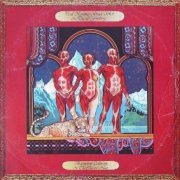 |
Baron von Tollbooth & the Chrome Nun (1973, 40.25) ***/TTTT |
|
| Ballad of the Chrome Nun Fat Flowers of the Night Walkin' Your Mind Has Left Your Body Across the Board Harp Tree Lament White Boy (Transcaucasian Airmachine Blues) |
Fishman Sketches of China |
|
Current availability:
Mellotron used:
Apparently named for David Crosby's nicknames for Kantner and Slick, Baron von Tollbooth & the Chrome Nun is a decidedly watered-down version of Jefferson Airplane, then in the last throes of dissolution, just before the dodgy Jefferson Starship rose from the ashes like a rather slick phoenix (pun intended). The material's a bit anodyne, to be honest, although it's immeasurably better than later Starship stuff, particularly from the '80s.
David Freiberg's Mellotron is used fairly extensively, with background strings on Fat and a much more upfront part on Flowers Of The Night, ditto Across The Board, while Harp Tree Lament adds flutes to the ubiquitous strings. Six out of ten tracks is pretty heavy usage and it's rarely hidden away in the mix, so top marks on the Mellotron front and recommended for that, at least.
See: Jefferson Airplane | Jefferson Starship
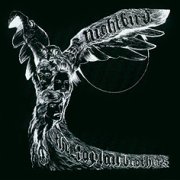 |
Nightbird (1976?, 41.21) **/TTT½Ode to LifeVodka and Caviare Epitaph Listen to the Falling Rain Life and Me Love is Life Night Bird Happy He |
Current availability:
Mellotron used:
The Kaplan Brothers were apparently a Chicago-based lounge act who freaked out completely and recorded this bizarre attempt at a concept album. I'm, well... really quite lost for words over Nightbird; cheesy easy listening music shoehorned into a pseudo-progressive format just makes it sound like the progenitors of this piece of lunacy ingested far too much brown acid at Woodstock and never quite got over it. The weirdest part of the album is track three. Yes, it's that Epitaph; if you've ever had a yearning to hear King Crimson played in a lounge stylee, well, here's your chance. Listen To The Falling Rain mixes nursery-rhyme lyrics with a brief burst of Grieg's Hall Of The Mountain King, although the rest of the album is outstanding only in its mediocrity. It's not even certain when this montrosity was released: I've had to shift my original date of 1974 to '76, whiile Discogs reckons '78.
I said, "I've no idea who played the Mellotron on the album, but he/she deserves a medal; it's splattered all over the place, played expertly and frequently at speed", although it seems it was Larry and John Kaplan. Opener Ode To Life features strings, oboe (?) and female choir, with more strings, including a relatively speedy arpeggiated part on Vodka And Caviare, with one of the quickest Mellotron parts I've ever heard on their bizarre take on Epitaph. Most of the rest of the use is strings, although those choirs rear their ugly heads again on a couple of tracks. I'm torn between giving this album one star for being complete rubbish, or the full five for its sheer chutzpah, so I've compromised on a rather measly two. This is possibly the weirdest album I've sat through over the last few years, although as listening experiences go, I've encountered an awful lot worse. At least Nightbird made me laugh in places, which is more than I can say for a few things I've run into... I can't honestly recommend this on musical grounds, but should you run into a copy cheap, it's probably worth it for the laugh and for its well over the top Mellotron.
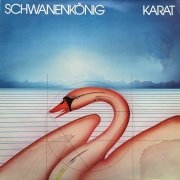 |
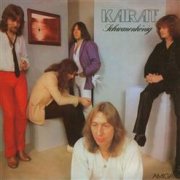 |
Schwanenkönig (1980, 45.16) ***/T |
|
| Tanz Mit der Sphinx Mitternacht-Blues Magisches Licht Der Boxer Le Doyen I Das Narrenschiff Tiefsee Großstadt |
Schwanenkönig Le Doyen II |
||
Current availability:
Mellotron used:
1980's Schwanenkönig was Karat's third album (second outside East Germany), as the West German Albatros (which I own) is apparently compiled from their first two LPs. Schwanenkönig (The Swan King) is a rather bitty effort, but then, the band were almost certainly constrained by their state-owned record company, the end result being rather middling rock with occasional proggy touches. Unsurprisingly, these constitute the album's highlights: the brief, instrumental string synth piece Le Doyen I, Tiefsee and Le Doyen II, other passable tracks including opener Tanz Mit Der Sphinx and cheesy synth ballad Magisches Licht.
Keys man Ulrich Ed Swillms plays Mellotron on Das Narrenschiff, with distant choirs during the all-keyboard instrumental section, followed by extremely upfront choirs, as if for contrast. This just scrapes three stars, frankly; for better East German prog, try Lift.
 |
Rococochet (2017, 33.23) ****/TT½Let Your BodyRo Coco Shay Cat's Eye My Cumulus Veil Malio Malio Open Little Phase Somnia Dub |
 |
Bird Rib (2020, 27.44) ***/½DeedeeInto Sporks Heavy Hand Bird Rib Brundle Beat Open Again Eventually |
Current availability:
Mellotrons used:
 |
Australian-born, British-based Leah Kardos is a classical pianist, I believe, whose third album, 2017's Rococochet, borders ambient for most of its length, gentle piano chiefly interspersed with saxophones, mallet percussion and her own Mellotron and synth parts, the only jarring note being Paul Glover's drums on opener Let Your Body and Open. Highlights are difficult to isolate, although perhaps My Cumulus Veil's subtle key changes feature her style at its apogee. Leah plays Tony Visconti's new M4000, with distant string and choir parts on Let Your Body, Mellotron piano (!) doubling something and cello on Ro Coco Shay, along with a more 'standard' string part and clicky sax (?), distinct from Lara James' real saxes on several tracks and flute on Cat's Eye. Strangely, the album's Mellotron work seems to be clustered in its first third, unless I'm missing some particularly obscure sounds later on, or are those choir and string parts in the distant background on Open and Little Phase? Either way, a fine album.
2020's mini-album Bird Rib is your classic 'bits'n'pieces' record, according to Leah's Bandcamp page, three of its six tracks being reworked leftovers from Rococochet, the others dating from sessions in 2011 and '13. To be brutally honest, I found much of this hard going, the liminal space between trip hop and jazz not being somewhere I feel that comfortable, although the title track and Brundle Beat work better for this listener. Very little Mellotron this time round, just choirs doubled with something non-Mellotronic on Heavy Hand, one of the previous album reworkings, so clearly Visconti Studio's M4000 again.
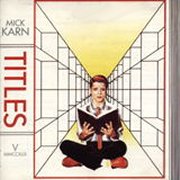 |
Titles (1982, 34.39) ***½/½Tribal DawnLost Affections in a Room Passion in Moisture Weather the Windmill Saviour, Are You With Me? Trust Me Sensitive Piper Blue |
Current availability:
Mellotron used:
Mick Karn (née Andonis Michaelides) released his first solo album a year after Japan's final gasp, Tin Drum (****), effectively carrying on in a similar vein, sparse instrumental textures overlaid with his ever-present hiccupping fretless bass. Although this is technically 'relaxed' music, Karn's bass work gives it a weird sense of edgy urgency, although the juxtaposition seems to work well enough. Difficult to pick out 'best' pieces, as, despite the gaps between tracks, the album works better as a unified whole, or rather, two unified wholes (?). Side one is instrumental, while side two is more 'song' based, featuring Karn's quite acceptable singing, although he lacks David Sylvian's Bowie-esque tones. Probably a good thing.
Very little Mellotron on the album; Karn puts some female choirs (?) onto Trust Me, but they almost have that 'Fairlight' sound about them, to be honest. As a result, avoid on the Mellotron front. If, however, you're a fan of Japan's quite unique thing, but you've never run into this before, give it a go. Oh and one bonus track on the CD, but I haven't heard it. Tragically, Karn died on January 4th, 2011, finally putting to rest any more 'Japan to reform' rumours.
See: Japan
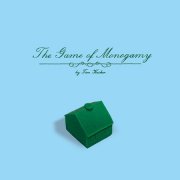 |
The Game of Monogamy (2010, 37.58) ***/T½ |
|
| Monogamy Overture A Grown Man I'm Afraid I'm Gonna Die Here Strays Cold Love Surprise, Surprise There Must Be Something I've Lost Bad, Bad Dreams |
No Fireworks The Prodigal Husband Monogamy |
|
Current availability:
Mellotron used:
Tim Kasher (also of Cursive and The Good Life) is an indie artist of some repute, apparently, his solo debut, 2010's The Game of Monogamy, being a passable enough effort within the genre. Strongest point? The lyrics, chiefly, although I've certainly heard far worse music in this field, better tracks including the gentle Strays and The Prodigal Husband.
Patrick Newbery plays Mellotron, with very wobbly and clicky choirs on I'm Afraid I'm Gonna Die Here, distant choirs on No Fireworks and a flute melody riding over more distant choirs on The Prodigal Husband. This is pretty much an 'indie fans only need apply' release, but it could be a great deal worse, while the Mellotron sounds like it might even be real.
See: Cursive | The Good Life
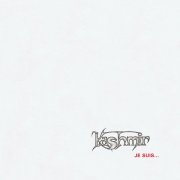 |
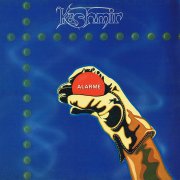 |
Je Suis... [a.k.a. Alarme!] (1979, 39.45) ***/T½Désert BleuJe Suis... Alarme! Linear Far Away Slowly 6 H 30 Go! |
Current availability:
Mellotron used:
Swiss duo Kashmir's Je Suis... (titled Alarme! elsewhere) is typical of progressive rock's gradual simplification in the late '70s, their sound akin to that country's Flame Dream, obvious influences including 10cc and Supertramp (listen to the Wurlitzer work on 6 H 30). For all that, it contains some good material, not least excellent synthy opener Désert Bleu, Linear and 6 H 30, although ten-minute closer Go! is actually a bit disappointing.
Patrice Guenat plays Mellotron, with volume-pedalled string chords and distant choirs on Alarme! itself and flute and string lines on Far Away, although the other massed voices and the strings on Go! are real. The band made one more album, '82's Histoire Cruelle, which apparently moves away from this album's sound, before disappearing into obscurity.
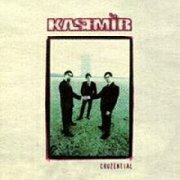 |
Cruzential (1996/97, 44.04/52.43) **½/½ (T½) |
|
| Vote 4 Dick Taid Stand Prawn's Blues Bring Back Superman Travelogue Could We Kill Fred? Dring Star in My Movie |
Gloom Beamed Lollypork Stomp Victoria Bag of Flash & Thyme |
|
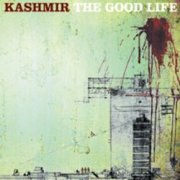 |
The Good Life (1999, 49.45) ***/TTT |
|
| Mom in Love, Daddy in Space Make it Grand Lampshade Graceland It's OK Now Miss You New Year's Eve Mudbath |
Gorgeous Kiss Me Goodbye |
|
 |
Home Dead (2001, 34.15) **/TUndisturbedHome Dead The Ghost of No One Miss You (Slight Return) Just a Phase Mom in Love, Daddy in Space (opiate version) Gorgeous (opiate version) |
Current availability:
Mellotrons used:
Kashmir had the misfortune to call themselves Nirvana when they formed in 1991, clearly not having heard of the British band of the same name, never mind (ho ho) Seattle's finest, already one album into their brief but meteoric career. They entered a Danish 'battle of the bands'-style contest, DM i Rock, in '93, having the bad luck to find themselves up against Tim Christensen's mighty Dizzy Mizz Lizzy, although they still secured a contract with the local branch of Sony, releasing their debut, Travelogue, a year later.
They followed up with '96's Cruzential, a slightly unfocussed effort, veering between the 'alt.rock' of much of the album, the DML-alike Bring Back Superman, alt./psych crossover Dring and mournful acoustic closer Bag Of Flash & Thyme. The album certainly has its moments, but far too much of it's lost in a Seattle-wannabee haze of quiet/loud. Just to confuse the issue, it was reissued the following year with two extra tracks, both singles from that year, italicised in the tracklisting above. Mads Tunebjerg plays Mellotron on the original release, with background strings on Travelogue, another entrant in the 'title track to the previous album' stakes (see: Zeppelin's Houses Of The Holy on Physical Graffiti, or Queen's Sheer Heart Attack from News of the World, which bucks the trend by using the title from three albums earlier), but nothing obvious on Dring, despite a credit, while Kasper Eistrup adds it to both of the 'new' tracks, with background strings on Stand and nicely upfront flutes and strings on Gloom.
Three years later, Kashmir became one of the slew of Danish pop/rock acts to be produced by Tim Christensen, post-DML. 1999's The Good Life, is a perfectly respectable and fairly cheese-free collection of songs, although few of them are especially memorable and even fewer have even a hint of the power of Zeppelin's namesake epic. Saying that, closers Gorgeous and Kiss Me Goodbye both have their epic moments and little here makes you wish they'd left it in the can. Christensen also plays keys (along with Floyd's '80s/'90s live keys man Jon Carin), including Mellotron, with strings all over opener Mom In Love, Daddy In Space, Gorgeous and Kiss Me Goodbye, background choirs on the actually-rather-good It's OK Now and both on New Year's Eve, making for a nicely Mellotron-heavy effort, as you'd expect when Tim gets his teeth between the bit.
Despite being the length of a short '70s album, 2001's Home Dead is classed as an EP, containing remixes of three tracks from The Good Life and four new tracks of post-rockish intent, none of which really stand out in any way. Henrik Lindstrand plays Mellotron, with cellos and some of the best-recorded Mellotron vibes I've ever heard on Miss You (Slight Return), although Christensen's Mellotron parts on the original versions of Mom In Love, Daddy In Space and Gorgeous are missing.
See: Tim Christensen
 |
Kono Yo ni Umarete Kitara (1974, 41.49) **½/T |
|
| Konoyo ni Umarete Kitara Omae no Jinsei Tada Hitokoto Kare ni Tsutaetai Kuro no Funauta Muyonosuke Iku Jidai ka ga Arimashite Anata no Kehai Asa no Shokuji |
Kedarui Warutsu Kosodate Jizo Teneshi Warutsu Haiiro no Hitomi |
|
Current availability:
Mellotron used:
Tokiko Kato is a singer/composer/actress, whose second album, 1974's Kono Yo ni Umarete Kitara, combines mainstream pop and balladry, with the occasional curveball thrown in. Better tracks? The vaguely bluesy Kuro No Funauta and the balladic Iku Jidai Ka Ga Arimashite and Kosodate Jizo, everything else being pretty forgettable.
At some point over the last decade or two, I've obviously been given some information about this album, including the possibility that it's Jun Fukamachi on Mellotron, not that there's much of it, merely background choirs on the opening title track and flutes on Kuro No Funauta, distinct from the real flute heard elsewhere. I can't honestly recommend this, but if you feel the need to hear it, it's on YouTube under the title If You Have Been Born Into This World.
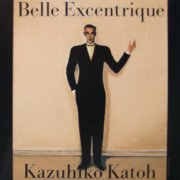 |
Belle Excentrique (1981, 30.49) ***/TTT |
|
| Scandale de Mme Rothchild Gigi, la Danseuse Bar Américain Diaghilev, l'Homme-Orchestre Les Nuits Folles de l'Hotel Negresco Masque Rose de Mme M Trocadèro Je Connaissais Jean Cocteau |
Adieu, Mon Amour Je Te Veux |
|
Current availability:
Chamberlin used:
Kazuhiko Katoh (1947-2009, of the Sadistic Mika Band, also transliterated as Kato) was a Japanese singer/songwriter/producer, whose seventh solo release, 1981's Belle Excentrique, could possibly best be described as 'Nippo-Gallic' in its wholesale appropriation of French imagery and musical styles. The end result, while something of a stylistic mish-mash, is actually very listenable, at its best on the fiddle-led Gigi, La Danseuse and the semi-progressive Je Connaissais Jean Cocteau.
This is one of two known tape-replay credits for the legendary Ryuichi Sakamoto, in this case, a Chamberlin, probably an older, two-manual version, recorded at Le Chateau in Paris. He really goes for it on several tracks, with an upfront flute part and strings on opener Scandale De Mme Rothchild, background strings on Gigi, La Danseuse, what sounds like rhythm tapes, vibes and a clarinet solo on Bar Américain and chordal strings on Masque Rose De Mme M and Je Connaissais Jean Cocteau, five of the six tracks on which he's credited.
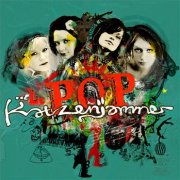 |
Le Pop (2008, 40.27) ***/T |
|
| Overture A Bar in Amsterdam Tea With Cinnamon Hey Ho on The Devil's Back Virginia Clemm Le Pop Der Kapitän Wading in Deeper |
Play My Darling, Play To the Sea Mother Superior Ain't No Thang |
|
 |
A Kiss Before You Go (2011, 40.55) ***/½ |
|
| A Kiss Before You Go I Will Dance (When I Walk Away) Cherry Pie Land of Confusion Lady Marlene Rock-Paper-Scissors Cocktails and Ruby Slippers Soviet Trumpeter |
Loathsome M Shepherd's Song Gypsy Flee God's Great Dust Storm |
|
Current availability:
Mellotrons used:
Katzenjammer are an all-female Norwegian quartet, whose music reflects its members' interests in various folk forms, including Balkan and French chanson, amongst other styles. They win extra Planet Mellotron brownie points for using a contrabass balalaika onstage, which really has to be seen to be believed. Their debut album, 2008's Le Pop, sounds like the above, with a noticeable sea-shanty influence thrown in, making for a raucous, fun album that I can imagine going down well at, oh, a pirate party, maybe? I shall inform the Pirate Party UK, or possibly Mad Cap'n Tom. The Mellotron's played by Anne Marit Bergheim and our old friend Kåre Christoffer Vestrheim, with strings on Virginia Clemm and Der Kapitän, although nothing that overt, sadly.
2011's A Kiss Before You Go isn't dissimilar to its predecessor, to the point where fans of that album are almost certain to go for this one, too, top tracks including the upbeat I Will Dance (When I Walk Away), the mildly deranged Cocktails And Ruby Slippers and the largely-a capella closer God's Great Dust Storm. Despite three credited Mellotron tracks (from Bergheim again, Marianne Sveen and Solveig Heilo), the only obvious use is the strings on Soviet Trumpeter, complete with extremely authentic wobble, leaving nothing audible on either the opening title track or Lady Marlene.
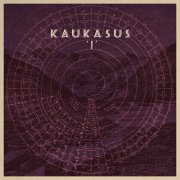 |
'I' (2014, 47.22) ****/TT½The Ending of the Open SkyLift the Memory In the Stillness of Time Starlit Motion Reptilian The Witness The Skies Give Meaning |
 |
download (2020) ***½/TT To Give |
Current availability:
Mellotron(s) used:
Kaukasus are a Norwegian/Swedish trio featuring both Rhys Marsh and Mattias Olsson (Änglagård, a hundred others), whose debut, 'I', reminds me of No-Man and other Tim Bowness projects; think: 'Scott Walker goes art-prog' and you won't be a million miles off the mark. The album shifts between the heavy-duty prog of its opening tracks, The Ending Of The Open Sky and Lift The Memory, the artier likes of In The Stillness Of Time and the flute-driven Starlit Motion and the superior 'crescendo rock' of closer The Skies Give Meaning, other stylistic pointers including Japan (albeit only slightly) and Talk Talk.
Marsh and Olsson both play Mellotron, with strings on The Ending Of The Open Sky and In The Stillness Of Time, raucous brass on Lift The Memory, overt strings and wobbly flutes on Reptilian and background strings on The Skies Give Meaning, often using it with considerable subtlety, in direct comparison with some of their contemporaries. A common feature of albums labelled I, 1, First or similar is how often they end up being a band's sole testament; let's hope the member of Kaukasus, busy though they are, make the time to work together again.
[Several years on] Well, that hope's been realised in a minimal kind of way by the download-only release of a single track, To Give, in a similar vein to the album, Mattias playing upfront Mellotron strings throughout. More please, chaps!
See: Rhys Marsh | Änglagård
 |
Angels' Waltz (2003, 68.31) **½/TAngels' WaltzAdi Shakti Guru Guru Wahe Guru Bolo Ram Ra Ma Da Sa Bhaja Man Mere |
Current availability:
Chamberlin used:
Sada Sat Kaur is American, although her original name seems to be lost in the mists of time. Born in the late '40s, a brief scene in Woodstock caught her attention, leading to her becoming a convert to Sikhism, although it took a chance meeting with producer Jeremy Toback for her to consider actually recording her take on that culture's sacred chants at the relatively advanced age of fifty-six. Said debut, 2003's Angels' Waltz, bears vague comparison with many Christian albums, in that it's more about a form of worship than the actual music per se; thankfully, it's far better than said tragic excuses for albums, which isn't to say that it's necessarily a wonderful listen.
Each track on the album seems to be based around a different instrument (bottleneck guitar on Adi Shakti, piano on Guru Guru Wahe Guru, pedal steel on Ra Ma Da Sa and Bhaja Man Mere), the opening title track heavily featuring Zac Rae's (Macy Gray, Lisa Marie Presley, many others) Chamberlin, with a string part running right through the twelve-minute piece. Generally speaking, if long-format, repetitive, trance-inducing Indian music with a Western bent floats your boat, you may well love this, although the rest of us should probably approach with caution. Kaur's other alleged tape-replay record, 2005's Shashara, turns out to feature nothing more than samples.
See: Samples etc.
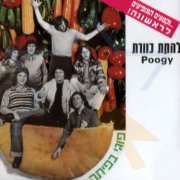 |
Poogy in a Pita (1974, 33.06) **/T |
|
| Natati La Cha'yay Moshe Ken, Moshe Loh Ochel Ta'Tzipornayim L'amour et la Vie Sookar Ba'Teh Hora He'achzoot Ha'Tamnoon Ha'Iter Shir Ha'Mechiron |
Shir Mecha'ah Ha'Balada Al Ari Veh'Derchi |
|
Current availability:
Mellotron used:
For some reason the perfectly well-named Kaveret (Beehive) opted to ridiculously rename themselves Poogy (their drummer's nickname, apparently) when they played abroad, clearly in the mistaken belief that it would travel better. 1974's Poogy in a Pita was their second album (of three), containing (as with many Israeli albums of the period) folk-influenced pop, with a slightly unwelcome 'comedy' edge that was only ever going to work for Hebrew speakers.
Vocalist Danny Sanderson and keyboard player Yonatan (Yoni) Rechter play Mellotron, with flutes and background strings on Ha'Balada Al Ari Veh'Derchi (The Ballad Of Arivederchi), although that would appear to be your lot, with nothing extra on the CD's bonus tracks. I think you'd have to be seriously into Israeli pop to really get anything out of this album; I'm sure it does what it does well, but from a Western European viewpoint, it's almost impossible to tell. One decent Mellotron track, anyway. Amuse bouche: The album's opening track was Israel's entry in the 1974 Eurovision Song Contest (you know, the Abba one), coming sixth.
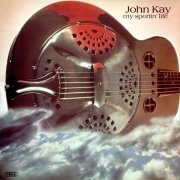 |
My Sportin' Life (1973, 37.27) **½/TMoonshine (Friend of Mine)Nobody Lives Here Anymore Drift Away Heroes and Devils My Sportin' Life Easy Evil Giles of the River Dance to My Song Sing With the Children |
Current availability:
Mellotron (or Chamberlin) used:
Born in Germany, Joachim Fritz "John Kay" Krauledat moved to Canada in his teens, becoming vocalist with the future Steppenwolf in 1965, playing with them, on and off, up to the present day. After the original band's dissolution in 1972, Kay began a solo career, releasing two albums before the band reformed for 1974's truly appalling Slow Flux. The second of these, 1973's My Sportin' Life, must've horrified Steppenwolf fans, being essentially a country album, the only recognisable track being his version of Dobie Gray's soft rock classic Drift Away (believe me, you'll know it when you hear it), while the one sop here for Steppenwolf fans is lengthy blues-rock closer Sing With The Children.
Someone, possibly famed 'Wrecking Crew' member Larry Knechtel, plays a tape-replay instrument on Giles Of The River, with a pseudo-orchestral string part that may or may not be the result of a relatively limited budget. Generally speaking, unless you're a fan of that soft rock/country crossover thing, you really aren't going to like this very much, although it's perfectly well done, so with a sole Mellotron/Chamberlin track, I'd have to advise you against.
See: Steppenwolf
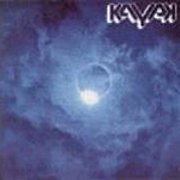 |
See See the Sun (1973, 48.10) ****/TTT½Reason for it AllLyrics Mouldy Wood Lovely Luna Hope for a Life Ballet of the Cripple Forever is a Lonely Thought Mammoth See See the Sun |
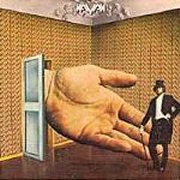 |
Kayak [a.k.a. Kayak II] (1974, 36.29) ****/TTT½AlibiWintertime Mountain Too Rough They Get to Know Me Serenades Woe and Alas Mireille Trust in the Machine His Master's Noise |
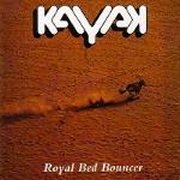 |
Royal Bed Bouncer (1975, 38.16) ****/TT½ |
|
| Royal Bed Bouncer Life of Gold (You're So) Bizarre Bury the World Chance for a Lifetime If This is Your Welcome Moments of Joy Patricia Anglaia |
Said No Word My Heart Never Changed |
|
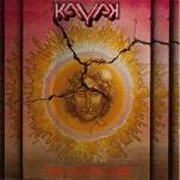 |
The Last Encore (1976, 41.35) ***½/T½ |
|
| Back to the Front Nothingness Love of a Victim Land on the Water The Last Encore Do You Care Still My Heart Cries for You Relics From a Distant Age |
Love Me Tonight/Get on Board Evocation Raid Your Own House Well Done |
|
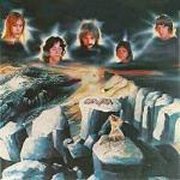 |
Starlight Dancer (1977, 42.37) ***/T½ |
|
| Daughter or Son Starlight Dancer Want You to Be Mine Letdown Irene Golddust May Turn the Tide |
Dead Bird Flies Forever Sweet Revenge Where Do We Go From Here? |
|
Current availability:
Mellotrons used:
Along with Earth & Fire, Kayak were the Netherlands' chief exponents of progressive pop, or song-based progressive rock; no real epics, but mostly interesting song structures. Like all such, they shifted further towards the mainstream by the late '70s, but their first few albums are definitely worth hearing. See See the Sun is classic Kayak, with proggier material like Mouldy Wood rubbing shoulders with more mainstream fare such as Lyrics (a hit in the Netherlands, I believe). Incidentally, this particular song leads to some confusion, with some copies of the album stating 'includes Lyrics' on the sleeve, only for you to find out it both doesn't and does, all at the same time.
Although most of the keys were played by Ton Scherpenzeel, when the band bought their Mellotron, it was decided that vocalist Max Werner (nicknamed 'Werlerofzoiets', meaning 'something like Werner'; in-jokes, eh?) would play it most of the time, in between his vocal duties. I think I'm right in saying that Werner actually started life as a drummer, then shifted across to the mic when they realised he had the best voice in the band. Anyway, in an interview I saw with Scherpenzeel a few years ago, he said that they'd hoped their Mellotron would make it sound like they were being backed by an orchestra; of course, it 'just' sounded like they were being backed by a Mellotron and, once they got their heads round that fact, they ran with it. See See the Sun has track-by-track credits, although you don't need them to hear Werner's upfront Mellotron strings on six of the nine tracks. None of them stand out particularly from the others, but the Mellotron use is good all round, making this well worth it on the Mellotron front.
Confusingly, Kayak is actually their second LP, every bit as good as their debut, with more classically-influenced songwriting, particularly Wintertime. Mountain Too Rough reminds me of their countrymen Trace, in places, although their first LP only came out the same year. It's actually a more 'progressive' album than its predecessor, with two of the band's longest tracks in They Get To Know Me and Trust In The Machine, so this may be a good place to start for the confirmed proghead. There's a bit of change on the Mellotron front, with a solo flute part in the lengthy-ish They Get To Know Me, also the album's Mellotronic highlight, superb strings closing the song. Woe And Alas also has a great string part, the other Mellotron tracks still having quite overt use.
Royal Bed Bouncer's opening title track is probably the catchiest thing the band (or rather, Scherpenzeel) ever wrote, not to mention one of their wittiest lyrics, particularly as they were writing in their second language. Nothing much over the five-minute mark here, but the songwriting's still well up to scratch, if possibly just a touch more mainstream. Werner's Mellotron is noticeably further in the background, though, although it's still present on half the tracks, the most overt use on Said No Word; watch for the real strings on a couple of tracks, though. The Last Encore carries on the work of its predecessors, although things are definitely more mainstream this time round; more and shorter songs, although there's still some interesting tracks here and there, notably Nothingness, with its excellent vocal arrangements and Relics From A Distant Age. Even less Mellotron (this time played by both Werner and Scherpenzeel), although Do You Care features choir and that must be Mellotron brass on Get On Board, both for the first time on a Kayak album, but, once again, some of the strings are real.
Starlight Dancer still has its moments, though Kayak's onward march to mainstream acceptance continued apace. In other words, although their style hadn't changed that radically since See See the Sun, most of the 'progressiveness' seems to have been knocked out of them somewhere along the line. About the best track is the instrumental, Irene, leaving the bulk of the material merely average, although there's nothing as hopeless as The Last Encore's Love Me Tonight/Get On Board, which is a blessing of sorts. Very little Mellotron this time, although Irene has a symphonic strings part and Dead Bird Flies Forever has a decent enough strings intro, leaving the album's Mellotron highlight as closer Where Do We Go From Here?, with a solid strings backdrop.
See: Ton Scherpenzeel | Max Werner
 |
7" (1970) **½/T½ Taste of Tears No Brass Band |
Current availability:
Chamberlin used:
New York-born Canadian singer (via Bermuda) Debbie Lori Kaye only ever released the one album, although her single releases stretch well into double figures. 1970's Taste Of Tears c/w No Brass Band sees a rather bland ballad backed with a far better 'story' song, which isn't to especially recommend either.
An unknown studio musician sticks wobbly Chamberlin strings all over the 'A', sounding as if the machine's about to cough its last, in your classic 'orchestral replacement' style. If you really want to hear this, it's on YouTube.
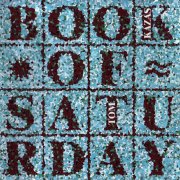 |
Book of Saturday (1993, 69.12) ***½/½ |
|
| Running Towards Dawn Lament Eastern Expanse Across Oceans Theme for a Future City From Tall Cliffs Paparounes A Thousand Blossoms |
Someday That is Saturday Vision of Serenity On Endless Nights Mediterranean Move A Water Cycle |
|
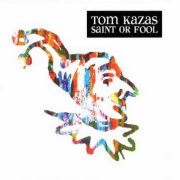 |
Saint or Fool (1997, 53.40) **½/T |
|
| Something Sacred Through the Eye of a Dragonfly Driving to the Airport Garden of Fascination Nothing at All The Ball While I Sleep The Washing Tide |
Day Like Today Not a Fever The Wednesday Song |
|
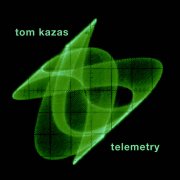 |
Telemetry (2003, 46.02) ***/TT |
|
| The First Minute... Into the Fathomless Reinvention Always Have to Choose Life on Earth She's From Fornax The Enlightenment Machine Complexity in Zoom |
End as Beginning Storms to Wash From A New Era The Last Minute... |
|
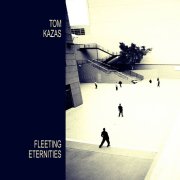 |
Fleeting Eternities (2006, 48.06) ***/T |
|
| Civil Time You Are Sky Search All You Like My Piano Played Winter Fault Report Long Near Far Short Into the Empyrean Katharsis |
The Ache Asymptoting Post Utopian Pause |
|
Current availability:
Mellotrons used:
Tom Kazas is probably best known as leader of '80s Aussie psychonauts The Moffs, although he's run a subsequent solo career for over thirty years at the time of writing. For anyone in doubt that he uses an actual Mellotron, here's a quote from a website written by a chap who got to do some demos with Kazas, commenting on the contents of his studio: "...he has an original mellotron!" So there you go.
Is 1993's Book of Saturday named in honour of the King Crimson song? Its sleeve has a distinctly Crimsoid look to it, but the album bears little comparison with Bob'n'the boys. It's a lengthy instrumental set, incorporating material more rhythmic (opener Running Towards Dawn, Theme For A Future City) and less (almost everything else), highlights including the nine-minute Eastern Expanse, the Japanese-sounding A Thousand Blossoms and the sparse On Endless Nights. Did I say 'no Crimson connection'? Calling a track Lament's a bit of a giveaway, not to mention Vision Of Serenity, which could be the most relaxed end of Crimso. Kazas adds exceedingly background Mellotron choirs to Mediterranean Move, in a 'don't bother' kind of way.
1997's Saint or Fool is something of a curate's egg, better material including opener Something Sacred, the 'very psychedelic' Through The Eye Of A Dragonfly, Garden Of Fascination and Not A Fever, although several tracks fall into the 'dreary and overlong' category, sad to say, not least the faux-Britpop of Day Like Today. Kazas adds background Mellotron strings to While I Sleep; while it's possible it's on another track or two, this is the only one for which I'm actually prepared to put my (essentially non-existent) reputation on the line. 1999's Music From... The Wound is a soundtrack album to a theatrical piece exploring the Greek-Australian experience, Kazas contributing no fewer than nine tracks out of fifteen, although, despite a credit, the nearest this gets to a Mellotron seems to be the background strings on opener Gift Or Curse.
2003's Telemetry is more song-based 'quiet end of indie' than anything, the nearest it gets to an outstanding feature being Kazas' distinctive baritone, better material including Reinvention, The Enlightenment Machine and brief, instrumental closer The Last Minute... Mellotron on several tracks, with a background string line on Reinvention, distant strings on Life On Earth, flute and string lines (with pitchbend) on She's From Fornax, more pitchbent strings on The Enlightenment Machine and watery strings on Storms To Wash From. 2006's Fleeting Eternities is another instrumental album, bordering ambient in places, at its probable best on the beautiful My Piano Played Winter, Into the Empyrean and The Ache. Only two obvious Mellotron tracks, with background flute lines on Search All You Like and The Ache, although it's possible it's hidden away in the mix elsewhere.
See: Moffs
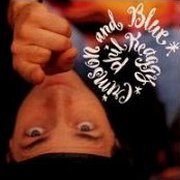 |
Crimson & Blue (1993, 69.40) **/T |
|
| Shouts of Joy World of Mine Everywhere I Look Love Divine Reunion of Friends All There is to Know When Will I Ever Learn to Live With God Stone Eyes |
I Will Be There Don't Pass Me By John the Revelator Doin' Nothin' Nothing But the Blood |
|
Current availability:
Mellotron used:
Even more CCM from Nick Hewitt.
This threatened to be terrible. Phil Keaggy, as well as issuing his own albums, also appears as a session musician/singer on innumerable other albums by a wide variety of other artists. These, in turn, are of quite variable quality, ranging from average down to toe-curling, knuckle-chewing, gut-stirring, vomit-inducing crap. This, however, is tending towards the average, but with an additional dose of plagiarism.
I don't think Mr Keaggy knows WHAT he is, if you have to attach titles of genre to an individual musician. Listening to this, you can quite clearly hear a number of styles that makes you think, "Hey, that's Cream", on Don't Pass Me By, John The Revelator and Doin' Nothin. It gets worse on Love Divine as it's so like The Beatles' All My Lovin' and the fact that Reunion Of Friends has also got both We Can Work It Out AND Hello Goodbye in it must also be pointed out. It is possible that Keaggy simply re-worked that style of music into the CCM canon and hoped that no one noticed. WRONG!
To be fair, Phil Keaggy IS trying to be different from other CCM artists. The trouble is, on the strength of this opus, he's doing it by copying other people's/bands' styles. This probably only works if no one spots it, but if you get reviewed by a confirmed train-spotter like me, then you're heading for a bit of a mauling. But I'm not going to do that. Well, not much! He does make a genuine attempt to 'do his own thing' and to be a bit inventive, which is where Keaggy gets most of the asterisks in his rating. Applying the Beatles and Cream styles to CCM is new to me, but I don't profess to listen to a great deal of CCM. I only hear what my wife puts on the stereo (which is where this review copy came from). He and whatever musicians he has around him at the time, performs competently, if not spectacularly. As well as 'copying' the styles noted above, the rest of the material is mid-paced 'rock', if I must apply some sort of comparison. He makes an attempt at something a little 'harder' on Shouts Of Joy, but it quickly loses any doominess and reverts to something a little happier, which seems a little self-contradictory. One nice experiment is a large chunk of Hendrix-esque solo rhythm guitar on Nothing But The Blood, which surprisingly works. You, however, may regard this as sacrilege. Fair Do's!
Mellotron, on the tracks noted above, is supplied by John Painter, a.k.a. John Mark Painter, who has played Mellotron under the latter appellation. (See Susan Ashton's eponymous album) It is used so sparingly on World Of Mine you can barely hear it. It's a different kettle of fish on I Will Be There, where it's part of the background rhythm. It's subtle and, in my view, effective, considering the slight C&W tinge present in the song.
It's CCM, so don't touch it. Similarly, there's not enough Mellotron in it, so please leave it alone!
| Nick Hewitt |